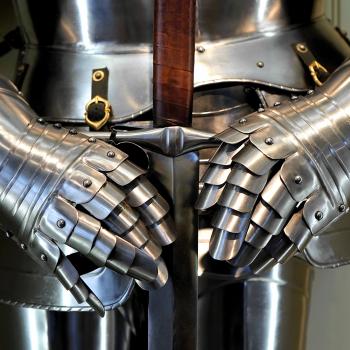To Train Up A Child, chapter 8, part 2
This section is the remainder of the “Selective Subjugation” chapter.
BLESSED MOTHER, HAVE MERCY
A number of times I have observed the difficult situation where one parent (usually the less sentimental father) is firm in training for obedience, but the other (usually the mother) gives in to sympathy and is slack to demand instant obedience. During the day while the father is away, the mother begs, nags, threatens, and after a while becomes sufficiently angry to impress upon the children the need to yield temporary compliance.
The father comes home from work and is soon confronted with the rebellion and disobedience of his children. When he spanks the children, they wail cries of injustice. The emotionally weak mother so suffers from seeing her babies “abused” by this “stranger” invading their domain that, in front of the children, she steps in to challenge his judgments. The children soon learn how to play the mother’s emotions against the father’s “justice.” As the mother becomes more and more critical of the father and protective of the children, the children become liars and learn to manipulate the contentious adults.
The father sees that he is losing control and bears down harder on the children. The mother, attempting to provide a balance, becomes even more slack; and the gulf between them widens. The children are the big losers.
Notice again that Michael is unable to imagine functional parenting. Parenting that does not involve beating children into submission must of necessity, in his eyes, involve begging, nagging, threatening, and gaining obedience through anger. This is so ignorant of the actual wide range of positive parenting techniques available that I have to wonder whether Michael is actually ignorant or is willfully misleading.
Can children play their parents against each other? Yes. Should parents be on the same general page on child rearing? Yes. But calling a mother who feels her husband’s discipline of the children goes too far “emotionally weak” and mocking the idea that a father could be abusive toward his children? Really? And this portrayal of children who feel that they are being treated unfairly or abused as being “liars” who “manipulate” their parents? No. Just, no.
Oh and by the way? Mothers can be abusive too. Michael completely erases abusive mothers and concerned fathers.
One parent should NEVER correct or question the other’s judgment in the presence of the children. It is better for your child if you support an occasional injustice than to destroy the authority base through your open division.
The odd thing is that Michael says not to correct or question a spouse’s parenting in front of the children, but then never actually tells parents how they should go about questioning a spouse’s parenting—or even that they should at all.
Oh, and does this go the other way too? If one parent lets a child off and doesn’t enforce obedience and submission, is the other parent to not correct or question that in the presence of the children? Michael is clearly, after all, talking about the reverse—“an occasional injustice”—and I somehow doubt he would want a parent following his methods to say nothing if the other parent treats a child gently and refuses to demand unthinking obedience.
We see this manifested when a child that is being disciplined by the father begins to plead for his mother. When a child runs to the mother, the mother should take up the discipline as forcefully as the father. If a father is attempting to make a child eat his oats, and the child cries for his mother, then the mother should respond by spanking him for whining for her and for not eating his oats. He will then be glad to be dealing only with the father.
We broke this tendency to selective subjection early. When one of us would be spanking a child and he cried for the other, then the other parent would come over and contribute to the spanking. Two or three times of that and a child decides that one is enough.
So let’s review. If you are worried that your husband is discipling your six-year-old daughter, and you feel that his spanking has crossed the line from spanking to beating, you should say nothing. Then, if the girl breaks away from her father and runs to you, you should immediately begin beating her just as her father was. In fact, if the girl so much as cries out for your your help while her father is beating her, you should go over and begin beating her along with your husband.
Michael leaves abused children no outs.
After a child has been spanked, he should not be allowed to flee to the other parent for sympathy. It is important that he find his solace in the one who did the spanking. When God chastens us, it is to draw us to himself, not to cause us to turn to another.
Speaking as someone who experienced this—no. Being forced to hug and accept comfort from a parent who has just humiliated you by hitting your bare bottom with the sharp sting of a paddle is very confusing and quite often very unpleasant.
Mother, if you think the father is too forceful in his discipline, there is something you can do. While he is away demand, expect, train for and discipline to receive instant and complete obedience from your children. When the father comes home the house will be peaceful and well ordered. The children will always obey their father, giving him no need to discipline them.
And now you see what I am saying! Michael tells parents not to contradict the other’s discipline in front of the children, but then tells mothers whose husbands are abusive toward the children to make sure the children are completely obedient rather than confronting their husbands about their abuse in private. Also, this isn’t how abusers work. With an abuser, any given level of submission and obedience is never enough—the bar is always moved.
So here’s a question: Is there a point where Michael would advise the wife of an abusive father to do something other than strictly disciplining their children to make sure they are 100% obedient for their father? Yes, actually. Here I want to quote from an article on Michael’s website:
If your husband is sexually abusing the children, or if he is bone-breaking violent, take it to the church. If he does not immediately repent and come under discipline, call the law and have him arrested. Whining promises followed by promises and broken promises and more promises is not acceptable. After being confronted for sexually abusing the children, if your husband does not repent in sackcloth and ashes, to never do it again, turn him over to the authorities. Testify against him, and when he gets three to twenty years in the pen, go to visit him and faithfully wait for him to get out.
Bone breaking. That’s the limit.
When a child has two caregivers, the child should, ideally, have an extra layer of protection against abuse. After all, if one caregiver is abusive, the other can protect the child in a variety of ways. They can confront the other caregiver about it, offer the child solace and support, and, ultimately, remove the child from the control of the abusive caregiver. But Michael short circuits this entirely, removing a level of protection. Unless, of course, the abuse is so bad that bones are broken. But if no bones are broken—suck it up and deal.
And yet, somehow, Michael has his defenders.














